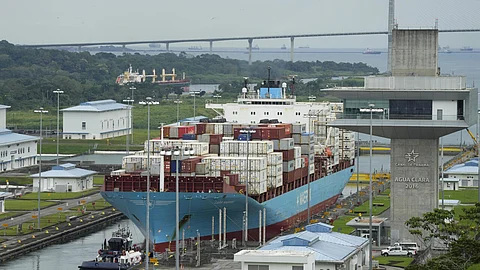
- NEWS
- the EDIT
- COMMENTARY
- BUSINESS
- LIFE
- SHOW
- ACTION
- GLOBAL GOALS
- SNAPS
- DYARYO TIRADA
- MORE

PANAMA CITY (AFP) — United States (US) President Donald Trump’s threat to seize the Panama Canal over alleged undue Chinese influence may really be aimed at limiting Beijing’s growing diplomatic and economic presence in Latin America, experts say.
Actually using force to take the interoceanic waterway, which carries five percent of world maritime trade and 40 percent of US container traffic, seems an unlikely endeavor, they concur.
Constructed by the US mainly with Afro-Caribbean labor and opened in 1914, the canal was administered by America until 1977, when treaties were signed under then-US president Jimmy Carter for its handover to Panama.
Since the handover in 1999, the canal has been managed by the Panama Canal Authority — an autonomous entity whose board of directors is appointed by the legislature and president of Panama.
The government has granted concessions to private company Hutchinson Ports — a subsidiary of Hong Kong-based conglomerate CK Hutchison Holdings — to operate ports on either extreme of the 82-kilometer waterway.
According to Rebecca Bill Chavez of the Inter-American Dialogue think tank, “Panama has honored the canal treaties by maintaining the canal’s operations efficiently and ensuring its neutrality.”
Yet Trump, in his inaugural address Monday, complained that “China is operating the Panama Canal, and we didn’t give it to China, we gave it to Panama.”
“China does not operate or control the Panama Canal,” Chavez said.
In the eye of the storm is Hutchinson Ports, which has operated the Balboa and Cristobal ports since 1997.
Trump’s Secretary of State, Marco Rubio, has questioned whether Chinese companies could take control of the ports under orders of Beijing and “shut it down or impede our transit.”
Panama’s President Jose Raul Mulino has insisted his country operates the canal on a principle of neutrality, as per the treaties.
“There are reasonable concerns related to the presence of a Chinese company,” Benjamin Gedan, director of the Washington-based Wilson Center’s Latin America program, told Agence France-Presse.
“The channel is of enormous value to the United States, both commercially and strategically,” Gedan said, adding it is a potential target were China to exert influence over Hutchinson Ports, or even nationalize it.
Beijing said Wednesday it has “never interfered” and “does not participate in the management and operation” of the canal, of which the US is the biggest user, followed by China.
Hutchinson Ports said audits a few years ago by the office of the comptroller, which oversees public spending, and the Panama Maritime Authority, found the company was in “full compliance” with its contractual obligations.
